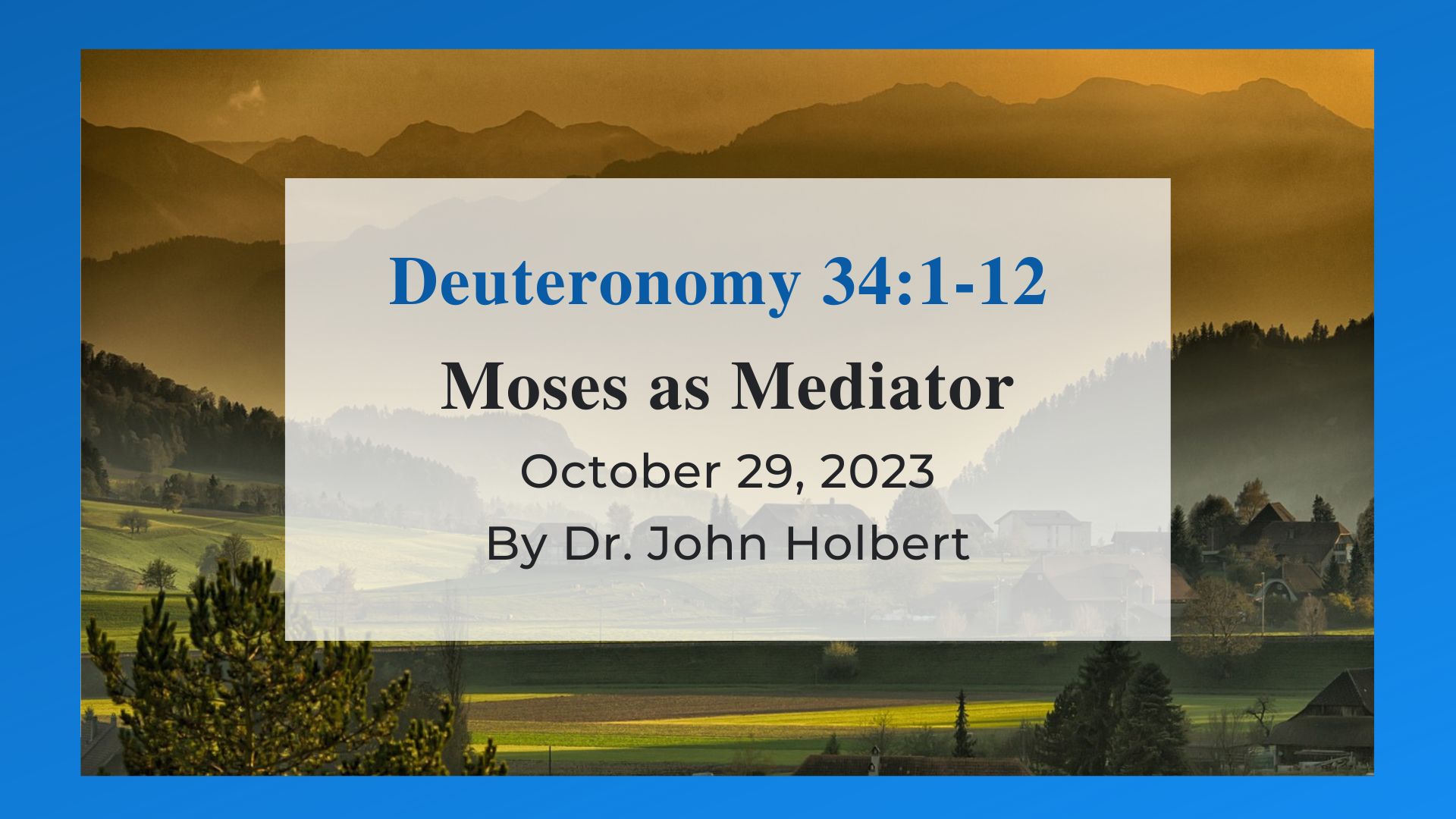Moses as Mediator - Reflections on Deuteronomy 34:1-12
by Dr. John Holbert on Monday, October 23, 2023

Moses as Mediator
Deuteronomy 34:1-12
The Peripatetic Hebrew Bible Preacher
The person of Moses in the Hebrew Bible has elicited an enormous pool of commentary of a most bewildering variety, from historical speculation to literary insights to philosophical and psychological hypotheses. Concerning history, the stark facts are that Moses is mentioned nowhere else outside of the pages of the Bible. That has led some scholars to suggest that he was not in reality an actual historical human being. Yet, as others have claimed, “If he did not exist, then he would have to be invented.” For me, whether or not he can be found in actual history is quite beside the point. Just as we ought not to waste our time searching for the site of the miracle of the Sea of Reeds (Ex.14), or wondering after just which pharaoh was the “pharaoh of the exodus,” any argument for the historical Moses is doomed to failure. What we have is the figure of Moses, reconstructed in the pages of our Bible by several different writers, from the earliest times of Israel’s story to the latest days of that narrative and on into the New Testament, where Jesus is portrayed as a new Moses, offering commandments from a mountain in Matthew’s gospel, and superseding Moses at the scene of transfiguration. Moses is clearly one of Scripture’s most important persons.
Deuteronomy 34 presents to us a kind of coda on the literary life of the great lawgiver, a portrait that Deuteronomy shapes throughout his lengthy book. For Deuteronomy, Moses is most especially a prophet, a role not particularly emphasized in earlier accounts in Exodus, though his calling at the famous bush becomes the very model of later prophetic calls. At Deut. 18:15, Moses promises that YHWH “will raise up for you a prophet like me.. him you shall pay attention to.” The Deuteronomic author here both announces that other prophets will arise who will teach future generations, while at the same time proclaiming that Moses’s own time as a prophet is coming to an end.
Earlier in the book, Moses reminds the people of their history of rebellion, echoing at Deut.9:25-29 his dangerous though successful intercession with a furious YHWH after the incident of the molten calf (Ex.32:11-14). He reminds the people how he interceded with YHWH for 40 days and nights on the holy mountain, pleading for YHWH to disregard the stubbornness and wickedness of the sinful people. YHWH spares the people, but then prohibits Moses from entering the land of promise, because, he says, “YHWH was angry with me also on your account, saying, ‘You shall not go in there’” (Deut.1:37). For Deuteronomy, the mediator Moses becomes the suffering intercessor. Though Moses does not complain of YHWH’s decision here, he requests YHWH, as he did in Exodus, to change the divine mind: “Let me go over, please, and see the good land beyond the Jordan” (Deut.3:25). YHWH replies rather huffily, “Speak no more to me of this thing” (Deut.3:26)!
Moses thus carries vicariously YHWH’s wrath against the chosen people. And thus we can see in the text for today just how his lonely death in Moab on Mt.Pisgah is likewise vicarious. YHWH buries Moses there, “and no one knows the place of his burial to this day” (Deut.34:6). There will be no sacred monument, no site of pilgrimage where later followers may celebrate and mourn their fallen prophet. Henceforth, Moses must live only in the hearts of the people as YHWH’s greatest prophet, the only one with whom YHWH spoke “face to face” (Deut.34:10). This claim clashes with the tale found in Ex.33 where Moses demands to see YHWH’s “glory,” in essence YHWH’s very being, while YHWH only shows Moses the divine “back.” Here the memory of Moses is raised considerably to be the only human prophet to see YHWH face to face. It might well be said that the figure of Moses in the Hebrew Bible, assembled in several parts from early to late in the tradition, offers a mediatorial memory, even a suffering mediator, that is a full prefiguring of the later Christian portrayal of Jesus of Nazareth, most often described as a suffering mediator for the whole world. Once again, we find in the Hebrew Bible elements of thought and literary creation that play significant roles in the Christian configuration of God as manifest in Jesus.
